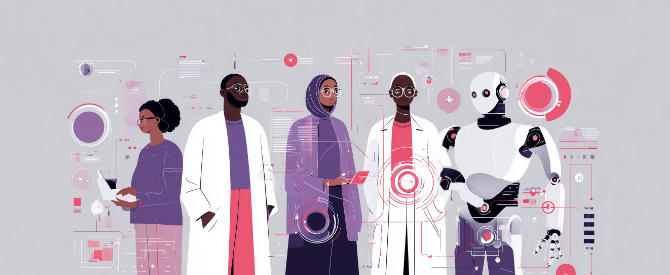
By Thabo Peyi
Jan 10th, 2025
5 - 7 min read
Shaping Tomorrow: Key Tech Trends for 2025

Related
Categories
All
Entertainment
Self Help
Tech News
Company Updates
Community
Social Media
The world of tech is ever-changing. Not too long ago, innovations such as wearable technology like Fitbit and on-demand streaming services were all the rage and a major topic of conversation.
Fast forward to 2025, and it feels like we’re having more grown-up discussions about technology. From cryptocurrency to the rise (and regulation) of artificial intelligence, we’re debating how these technologies, among others, will impact our everyday lives.
In this article, we predict the tech trends of 2025 and explore how they will shape not only this year but the years to come.
How These 3 Tech Trends Will Redefine 2025

Generative AI, also known as generative artificial intelligence, is a type of AI that uses machine learning to create various forms of content. This content can range from images and videos to music and even research papers for secondary school and university students.
In 2024, we witnessed a surge in generative AI adoption as more industries integrated this tool into their business practices, enabling them to streamline operations and boost productivity. Last year, Google launched an exciting initiative in the field of AI called Search Generative Experience (SGE), which will transform the way we use Google. Users can now search for simple or more complex queries, and with the help of generative AI, they receive quick, clear, and concise answers without the need to scroll aimlessly through irrelevant content. Expect to see increased investment in SGE from Google, further enhancing the user experience!
Another industry expected to undergo rapid transformation due to generative AI is healthcare. Doctors can be able to provide real-time diagnoses to their patients, receive assistance during surgeries, and develop more personalised treatment plans.
Education is also expected to be significantly impacted by the rise of AI, as teachers can use it to develop customised learning programmes, making education more inclusive for everyone.
Generative AI isn’t expected to take people’s jobs but rather to become a co-creator in the production of content, assisting in evaluating the creative process by contributing to brainstorming sessions and improving drafts. With advancements in the capabilities of generative AI, the quality and efficiency of project outputs are set to improve significantlly.

Green technology, or sustainable technology, refers to the use of various technological tools to help reduce or eliminate the negative impact humans have on the environment in a manner that is sustainable for its long-term betterment. Green tech encompasses areas such as renewable energy, water conservation, and waste management, to name a few.
As the world strives to stay on track with the Paris Agreement to achieve net-zero emissions by 2050, we may see a stronger push from tech companies to make sustainable technology more accessible. This could involve creating products that are both cost-effective and environmentally beneficial.
For instance, solar panels may become more affordable for homeowners. Additionally, green tech industries might turn to artificial intelligence to enhance their products. The energy sector, for example, could leverage AI to develop smarter energy grids that better meet demand.

Autonomous systems refer to systems that can conduct sophisticated tasks without the need for human interaction. These systems can operate in environments that are unconventional for machines and still manage to execute their given tasks. They can adjust based on the information they receive. Examples of these systems include self-driving cars and autonomous robots.
Autonomous systems have advanced tremendously over the years, transforming many different industries and significantly impacting people’s everyday lives. With advancements in artificial intelligence, we can expect even more growth in autonomous systems.
Tesla is recognised as a global leader in autonomous vehicles, but other companies such as Waymo and Cruise have also developed self-driving cars, enabling humans to travel independently without needing to know how to drive. In cities across the globe, delivery companies have utilised autonomous systems—such as self-driving cars, drones, and robots—to deliver products to their customers, reducing the need for human intervention.
With the continued advancements in artificial intelligence, we can expect major integration of autonomous systems into our everyday lives, from public transportation to retail services.
2025 is expected to be another significant year in tech, with major transformations on the horizon. The advancement of technology will not only make life easier for people but also foster greater inclusivity across various industries. Tech trends like these, along with others, will shape our future and open the door to many new possibilities.
Latest Blogs
In a world of endless scrolling and infinite choice, connection…
2026 is set to redefine technology with AI supercomputing, agentic…
Shaping Tomorrow: Key Tech Trends for 2025

Thabo Peyi
Jan 10th, 2025
5-7 min read

The world of tech is ever-changing. Not too long ago, innovations such as wearable technology like Fitbit and on-demand streaming services were all the rage and a major topic of conversation.
Fast forward to 2025, and it feels like we’re having more grown-up discussions about technology. From cryptocurrency to the rise (and regulation) of artificial intelligence, we’re debating how these technologies, among others, will impact our everyday lives.
In this article, we predict the tech trends of 2025 and explore how they will shape not only this year but the years to come.
How These 3 Tech Trends Will Redefine 2025

Generative AI, also known as generative artificial intelligence, is a type of AI that uses machine learning to create various forms of content. This content can range from images and videos to music and even research papers for secondary school and university students.
In 2024, we witnessed a surge in generative AI adoption as more industries integrated this tool into their business practices, enabling them to streamline operations and boost productivity. Last year, Google launched an exciting initiative in the field of AI called Search Generative Experience (SGE), which will transform the way we use Google. Users can now search for simple or more complex queries, and with the help of generative AI, they receive quick, clear, and concise answers without the need to scroll aimlessly through irrelevant content. Expect to see increased investment in SGE from Google, further enhancing the user experience!
Another industry expected to undergo rapid transformation due to generative AI is healthcare. Doctors can be able to provide real-time diagnoses to their patients, receive assistance during surgeries, and develop more personalised treatment plans.
Education is also expected to be significantly impacted by the rise of AI, as teachers can use it to develop customised learning programmes, making education more inclusive for everyone.
Generative AI isn’t expected to take people’s jobs but rather to become a co-creator in the production of content, assisting in evaluating the creative process by contributing to brainstorming sessions and improving drafts. With advancements in the capabilities of generative AI, the quality and efficiency of project outputs are set to improve significantly.

Green technology, or sustainable technology, refers to the use of various technological tools to help reduce or eliminate the negative impact humans have on the environment in a manner that is sustainable for its long-term betterment. Green tech encompasses areas such as renewable energy, water conservation, and waste management, to name a few.
As the world strives to stay on track with the Paris Agreement to achieve net-zero emissions by 2050, we may see a stronger push from tech companies to make sustainable technology more accessible. This could involve creating products that are both cost-effective and environmentally beneficial.
For instance, solar panels may become more affordable for homeowners. Additionally, green tech industries might turn to artificial intelligence to enhance their products. The energy sector, for example, could leverage AI to develop smarter energy grids that better meet demand.

Autonomous systems refer to systems that can conduct sophisticated tasks without the need for human interaction. These systems can operate in environments that are unconventional for machines and still manage to execute their given tasks.
They can adjust based on the information they receive. Examples of these systems include self-driving cars and autonomous robots.
Autonomous systems have advanced tremendously over the years, transforming many different industries and significantly impacting people’s everyday lives. With advancements in artificial intelligence, we can expect even more growth in autonomous systems.
Tesla is recognised as a global leader in autonomous vehicles, but other companies such as Waymo and Cruise have also developed self-driving cars, enabling humans to travel independently without needing to know how to drive.
In cities across the globe, delivery companies have utilised autonomous systems—such as self-driving cars, drones, and robots—to deliver products to their customers, reducing the need for human intervention.
With the continued advancements in artificial intelligence, we can expect major integration of autonomous systems into our everyday lives, from public transportation to retail services.
2025 is expected to be another significant year in tech, with major transformations on the horizon.The advancement of technology will not only make life easier for people but also foster greater inclusivity across various industries.
Tech trends like these, along with others, will shape our future and open the door to many new possibilities.











